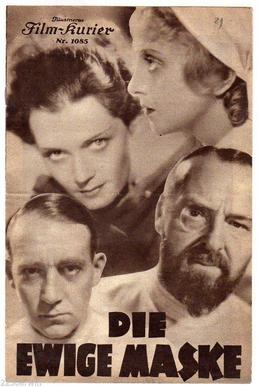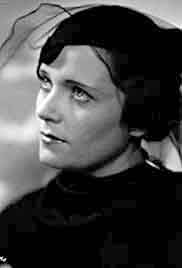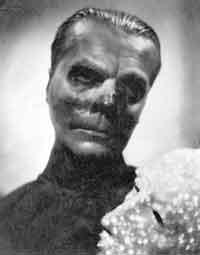 This interesting but largely forgotten 1935 Swiss-German production was a landmark in the expressionist film cycle. Something of a companion-piece to THE CABINET OF DR. CALIGARI—and the lesser known SECRETS OF A SOUL (1926)—THE ETERNAL MASK (DIE EWIGE MASKE) was a standout work by the prolific German director Werner Hochbaum (1899-1946). It was quite popular in its day, winning multiple awards from the Venice Film Festival and the USA’s National Board of Review, only to vanish pretty thoroughly; the film, in fact, was long thought lost until a Hungarian subtitled version was dug up in 2012.
This interesting but largely forgotten 1935 Swiss-German production was a landmark in the expressionist film cycle. Something of a companion-piece to THE CABINET OF DR. CALIGARI—and the lesser known SECRETS OF A SOUL (1926)—THE ETERNAL MASK (DIE EWIGE MASKE) was a standout work by the prolific German director Werner Hochbaum (1899-1946). It was quite popular in its day, winning multiple awards from the Venice Film Festival and the USA’s National Board of Review, only to vanish pretty thoroughly; the film, in fact, was long thought lost until a Hungarian subtitled version was dug up in 2012.
 The opening scenes are fairly straightforward—if extremely stark and shadowy—in conception and visual design, depicting a hospital wherein an experimental serum is being cooked up by one Dr. Dumartin. The head doctor forbids its use, but Dumartin surreptitiously injects it into the body of a severely ill meningitis patient. The latter briefly improves but then has a sudden relapse and dies. The disgraced Dumartin is plunged into despair, quitting his post and becoming a recluse.
The opening scenes are fairly straightforward—if extremely stark and shadowy—in conception and visual design, depicting a hospital wherein an experimental serum is being cooked up by one Dr. Dumartin. The head doctor forbids its use, but Dumartin surreptitiously injects it into the body of a severely ill meningitis patient. The latter briefly improves but then has a sudden relapse and dies. The disgraced Dumartin is plunged into despair, quitting his post and becoming a recluse.
Here the shadows deepen, overwhelming the screen as we’re plunged into Dumartin’s increasingly disturbed mental state. After a wander through a dark alley he attempts suicide by jumping into a canal. Dumartin survives and is taken back to the hospital he vacated, where he’s beset with hallucinations. Among other things, he visualizes himself led into a spectral corridor through which unearthly lights stream and phantoms dance.
Ironically, it’s discovered by the hospital’s staff that Dumartin’s serum actually works. This is a problem, as only Dumartin knows the properties of the serum, and is lost in a delirium of his own making.
 The early scenes of this film are, again, largely undistinguished cinematically, aside from an interesting montage editing scheme utilized in a couple scenes. The blandness continues in the subsequent depictions of the “reality” of the hospital where so much of the film is set, which are dull and talky. Far more interesting are the hallucinatory sequences, which are quite dated in their use of (now clichéd) elements like smoke, flashing lights and expressionistic distortion, but still potent. Most interesting of all are the climactic scenes in which reality and fantasy converge, with Dumartin’s doctor colleagues entering into and interacting with his private universe.
The early scenes of this film are, again, largely undistinguished cinematically, aside from an interesting montage editing scheme utilized in a couple scenes. The blandness continues in the subsequent depictions of the “reality” of the hospital where so much of the film is set, which are dull and talky. Far more interesting are the hallucinatory sequences, which are quite dated in their use of (now clichéd) elements like smoke, flashing lights and expressionistic distortion, but still potent. Most interesting of all are the climactic scenes in which reality and fantasy converge, with Dumartin’s doctor colleagues entering into and interacting with his private universe.
The hallucinatory sequences may be a bit too carefully delineated (as opposed to CALIGARI, where it wasn’t revealed until the end that we were viewing the delusions of a madman), complete with the periodic use of an off-screen narrator to fill us in on what’s going on in the protagonist’s mind. The happy ending, in which all is made right with Dumartin’s psyche via the removal of an imaginary mask from his face, is also a let-down—although the final image, of a medical cross transforming into a shining beacon via once state-of-the-art animation, is striking.
Vital Statistics
THE ETERNAL MASK (DIE EWIGE MASKE)
Progress Film
Director: Werner Hochbaum
Screenplay: Werner Hochbaum, Leo Lapaire
(Based on a novel by Leo Lapaire)
Cinematography: Oskar Schnirch
Editing: Else Baum
Cast: Mathias Wieman, Peter Petersen, Franz Schafheitlin, Tom Kraa, Thekla Ahrens, Olga Tschechowa, Karl Skraup
